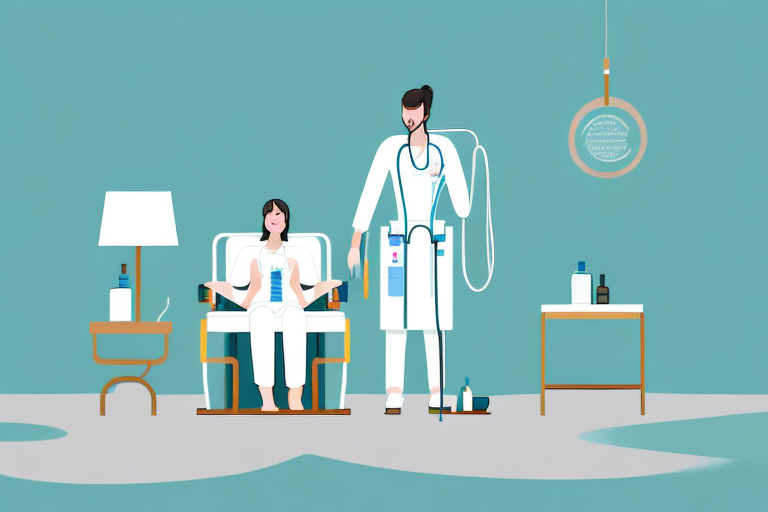Vegas Strip IV Therapy: Rejuvenate and Revitalize

Joseph Lopez • May 19, 2023
Table of Contents
Las Vegas is known for its extravagant entertainment, luxurious hotels, casinos, and exciting nightlife. However, with all the hustle and bustle of the city, it's easy to forget to take care of yourself. That's where Vegas Strip IV Therapy comes in - a revitalizing experience that will leave you feeling refreshed, rejuvenated, and ready to take on Sin City!

Understanding IV Therapy
Before we dive into the top benefits of IV therapy and the available options on the Vegas Strip, let's explore how it works.
What is IV Therapy?
Intravenous therapy, or IV therapy, is a medical treatment that delivers fluids, vitamins, minerals, and nutrients directly into your bloodstream through a tube inserted into your vein.
IV therapy has been used in hospitals for decades to treat a variety of conditions, including dehydration, nutrient deficiencies, and infections. However, in recent years, IV therapy has become increasingly popular as a wellness treatment, with many spas and clinics offering IV drips for everything from hangovers to skin rejuvenation.
How Does IV Therapy Work?
IV therapy works by bypassing the digestive system, which means that you absorb 100% of the nutrients, unlike oral supplements, which can lose potency during digestion.
The IV infusion itself is a quick and painless process, lasting anywhere from 30 to 60 minutes, depending on the specific treatment. During the procedure, a healthcare provider will insert a small catheter into your vein, typically in your arm or hand. The catheter is attached to a bag of saline solution, which contains the vitamins, minerals, and other nutrients that you need.
Once the catheter is in place, the saline solution will flow into your bloodstream, delivering the nutrients directly to your cells. Because the nutrients are delivered directly to your cells, they can be absorbed and used more quickly and efficiently than if they were taken orally.
In addition to delivering nutrients, IV therapy can also be used to remove toxins from the body. For example, a chelation therapy IV can be used to remove heavy metals from the body, while a glutathione IV can help to detoxify the liver and improve overall health.
Overall, IV therapy is a safe and effective way to improve your health and wellness. Whether you're looking to boost your immune system, improve your energy levels, or recover from a night of partying, IV therapy can help you feel your best.
Top Benefits of IV Therapy
Now that we have an understanding of IV therapy, let's explore some of the top benefits of this treatment.
Boost Energy Levels
IV therapy infusions can boost your energy levels by delivering a high dose of vitamins and minerals, such as B12, that support your metabolism and help to fight fatigue and exhaustion.
A boost in energy levels is particularly helpful for those who have been partying or engaging in other strenuous activities while in Vegas.
In addition to B12, IV therapy can also deliver other energy-boosting nutrients like magnesium, calcium, and amino acids, which can help to support adrenal function and improve overall energy levels.
Enhance Immune System
IV therapy can help strengthen your immune system and help prevent illnesses, especially during the flu season.
The infusion contains high doses of Vitamin C, which strengthens your immune system, builds collagen, and helps reduce the risk of chronic diseases.
Other immune-boosting nutrients that can be delivered through IV therapy include zinc, selenium, and glutathione, which can help to support detoxification and reduce oxidative stress in the body.
Improve Athletic Performance
IV therapy can help improve athletic performance by providing your body with the necessary nutrients to help it recover and function optimally.
The infusion can also reduce inflammation, boost endurance, and improve circulation to support muscle recovery.
In addition to the nutrients mentioned earlier, IV therapy can also deliver amino acids like glutamine and arginine, which can help to support muscle growth and repair.
Promote Skin Health
The high dose of vitamins and minerals in IV therapy can help to promote healthy skin by reducing inflammation, building collagen, and reducing the appearance of fine lines and wrinkles.
In addition to Vitamin C, IV therapy can also deliver other skin-loving nutrients like Vitamin E, which can help to protect against UV damage, and biotin, which can help to support healthy hair and nails.
Support Hangover Recovery
IV therapy is a popular choice for those who enjoy the Vegas nightlife and need relief from a hangover.
The infusion can rehydrate the body, replenish electrolytes, and provide a dose of vitamins and minerals that can help alleviate fatigue, nausea, headaches, and other hangover symptoms.
IV therapy can also deliver liver-supporting nutrients like glutathione and N-acetyl cysteine, which can help to support detoxification and reduce inflammation in the body.
Overall, IV therapy is a safe and effective way to deliver high doses of nutrients directly into the bloodstream, bypassing the digestive system and ensuring maximum absorption.

IV Therapy Options on the Vegas Strip
Las Vegas is known for its vibrant nightlife, luxurious hotels, and world-class entertainment. However, all the excitement and indulgence can take a toll on your body, leaving you feeling drained and dehydrated. Fortunately, there are various IV therapy options available on the Vegas Strip to help you rejuvenate and recover.
Customized IV Drips
Customized IV drips are a popular option among visitors to Las Vegas. These drips allow you to tailor your infusion to your specific needs, ensuring that you get the nutrients your body needs to function at its best. Whether you need a boost of energy, want to enhance your immune system, or are recovering from a night of drinking, a customized IV drip can help.
The infusion can be customized to include vitamins, minerals, antioxidants, and other nutrients that support your overall health and wellness. For example, if you're feeling tired and run down, a drip containing B vitamins and amino acids can help boost your energy levels and improve your mood. If you're recovering from a hangover, a drip containing electrolytes and anti-nausea medication can help alleviate your symptoms.
Vitamin Shots
If you're looking for a quick and efficient way to boost your vitamin levels, vitamin shots are a great option. These shots deliver high doses of specific vitamins directly into your bloodstream without the need for a full IV infusion. This means that you can get the benefits of IV therapy without the time commitment.
The shots are administered quickly and efficiently, usually lasting only a few seconds. You can choose from a range of vitamin shots, including B12 shots, vitamin C shots, and glutathione shots. Each shot is designed to target a specific area of your health, such as boosting your energy levels, improving your immune system, or promoting healthy skin.
Oxygen Therapy
Oxygen therapy is another popular option on the Vegas Strip. This therapy involves breathing pure oxygen through a mask or nasal tube. The treatment can help alleviate headaches, fatigue, and hangover symptoms by increasing oxygen levels in the blood.
During the therapy, you'll sit comfortably while breathing in pure oxygen. The treatment is quick and painless, usually lasting only 15-20 minutes. Oxygen therapy can be combined with other IV therapies to enhance their benefits and help you feel your best.
Overall, IV therapy is a great way to boost your health and wellness while visiting Las Vegas. Whether you're looking to recover from a night of partying or simply want to feel your best, there's an IV therapy option that's right for you.
Choosing the Right IV Therapy for You
Choosing the right IV therapy for you depends on your specific needs, health conditions, and consultation with medical professionals.
IV therapy is a medical treatment that involves the administration of fluids, vitamins, and minerals directly into the bloodstream through a vein. It is a quick and effective way to deliver essential nutrients to the body, and it can help with a variety of health concerns.

Consultation with Medical Professionals
It's essential to seek medical advice before undergoing any medical treatment, including IV therapy.
<p>During a consultation with a medical professional, they will review your medical history, current health status, and any medications you are taking. They will also discuss the benefits and risks of IV therapy and answer any questions you may have.
If you have any underlying health conditions, such as kidney disease or heart problems, your medical professional may recommend a specific type of IV therapy or advise against it altogether.
Personalized Treatment Plans
At Vegas Strip IV Therapy, we provide personalized treatment plans tailored to your specific health needs and preferences.
Our team of experienced medical professionals will recommend the best treatment options for you based on your health history and current medical condition.
We offer a variety of IV therapy treatments, including hydration therapy, vitamin infusions, and detoxification therapy. Each treatment is designed to address specific health concerns and provide the necessary nutrients for optimal health.
Our hydration therapy treatments can help with dehydration, fatigue, and jet lag. Our vitamin infusions can provide a boost of energy, improve immune function, and help with skin health. Our detoxification therapy can aid in the removal of toxins from the body and improve overall wellness.
In conclusion, if you want to feel your best while in Vegas, IV therapy is an excellent option to consider. With its many benefits, quick infusion process, and various options available on the Vegas Strip, you can quickly revive, refresh, and get back to exploring everything that Sin City has to offer.
So why not book a consultation with one of our medical professionals today and start feeling your best?




